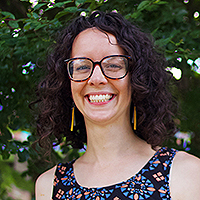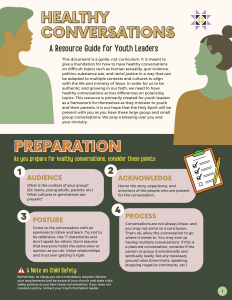by Brooke Martin
How do I disciple and walk with someone whose perspective, theology, or experience is not my own, or is different than the majority of people in my congregation? I know I am supposed to love them, but how? What if this is a person whose identity conflicts with my church’s view but they are an active part of the congregation, looking to me as their pastor or youth leader?
In a culture that dismisses anyone with a different understanding than our own, we can quickly lose track of our call to be Third Way people. Jesus taught that there are not just two options in times of disagreement or conflict; instead, he encouraged his followers to seek out a third way, to completely change the dynamic of disagreement.
Jesus illustrated this concept with the example of “walking the extra mile.” The law stated that a soldier was allowed to make a civilian carry his heavy pack for one mile only. Jesus told his followers to walk the extra mile. Imagine the soldier turning at the mile mark, anticipating a glare of disdain as the civilian shucked the heavy load. Instead, as the soldier turns to the civilian, the one who is called to the Third Way, continues to walk with the load. Do they make eye contact or have a clarifying conversation? Both the soldier and the civilian would change from their usual ways of thinking and engage differently during this next mile. The power dynamic has shifted: the situation and their relationship with one another has changed.
At Spruce Lake’s Engage Conference for youth leaders, I experienced a modern-day example of Third Way living when I listened to the storytelling of Art Pareira, the Director of Community Care for ReVoice. I anticipated that Pareira would share his list of why he was right and others were wrong; instead, I had a “second mile” experience. Pareira’s call to youth leaders was to not stop at the first mile but to continue walking with their youth to a deeper level of care and consistency. If we just focus on our duty to fulfill our understanding of God’s law, we miss the opportunity to journey deeper and further towards where Christ is calling us on the “second mile.”
As a celibate gay man, Pareira lives and ministers out of his own experience and theological perspective, naming that he takes “hits” from all sides, not being progressive enough for some or conservative enough for others.i Still Pareira continues his call to walk on. Pareira understands and accepts others may have different theological understandings, and he respects those differing convictions. He does, however, call Jesus-followers not to stop there but to continue as shepherds who are willing to walk beyond the first mile. In the second mile, he calls for the caring of people and encouraging consistency in ethical living across all sexual orientations.
With this “second mile” mindset, the Mosaic Youth Formation Team has created a Healthy Conversations guide for youth leaders and others who desire tools for conversations across differences of all kinds. We pray this guide will be a resource and encouragement so that, together, we can continue the journey of faith formation by walking beyond the first mile into the holy second mile of truly loving our neighbors.
Introducing the Healthy Conversation Guide
This document is a guide, not curriculum. It is meant to give a foundation for how to have healthy conversations on difficult topics such as human sexuality, gun violence, politics, substance use, and racial justice in a way that can be adapted to multiple contexts and cultures to align with the life and ministry of Jesus.
iArt Pareira has chosen a celibate lifestyle because of his belief affirming that God intends marriage to be a covenant between one man and one woman for life. This belief is also affirmed by Spruce Lake Ministries.
The opinions expressed in this content are those of the author and may not reflect the official policy of Mosaic Conference.

Brooke Martin
Brooke Martin is the Youth and Community Formation Pastor for Mosaic Conference. Brooke lives in Telford with her husband, Nathaniel, and their two children.
The opinions expressed in articles posted on Mosaic’s website are those of the author and may not reflect the official policy of Mosaic Conference. Mosaic is a large conference, crossing ethnicities, geographies, generations, theologies, and politics. Each person can only speak for themselves; no one can represent “the conference.” May God give us the grace to hear what the Spirit is speaking to us through people with whom we disagree and the humility and courage to love one another even when those disagreements can’t be bridged.

